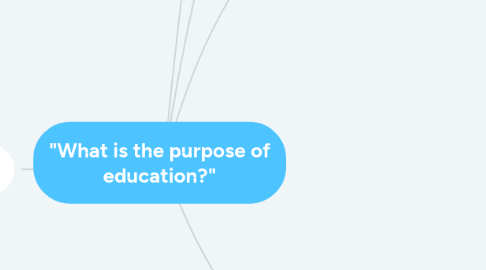
1. Extra Quotes for Fun
1.1. This Mind Map is here to separate the different themes under which "Education's purpose" had been looked at. Either one of these themes could make a good argument about education's purpose in society, especially if you measure its purpose with its impact.
1.1.1. The following themes are broken down to explain Education's purpose in relation to society at large via its impact on the population or the individual: Futurity, Economy, Philosophy and Fundamentalism.
2. The Philosopher's Reasoning
2.1. Having seen a few quotes in class, it became apparent that a lot of what some expressed education to be was centred around helping those find themselves. In essence, education seemed like a chance to teach ourselves what it truly means to be a human being.
2.1.1. “[The purpose of education] has changed from that of producing a literate society to that of producing a learning society.” —Margaret Ammons, Associate Secretary of ASCD
2.1.1.1. What makes up a formal education is also very subjective. The elements of education are significant only because it serves to bring about the success of a student. Their significance is measured by its usefulness.
2.1.1.1.1. For teachers and Professors, education takes on a whole new perspective. This is understandable because an education begins with a professional sharing experience and teaching pupils a skill. So it should be noted that "an educational philosophy is a personal statement of a teacher's guiding principles about "big picture" education-related issues, such as how student learning and potential are most effectively maximized, as well as the role of educators in the classroom, school, community, and society..." [SEE ARTICLE LINK]
3. The Fundamentalist's Reasoning
3.1. Fundamentally, however, education's primary goal can be asserted to be to get the next generation ready to support themselves as well as the other older generation that have aged out of society's "use".
3.1.1. "The first purpose of education (both in importance and chronologically) must be to ensure that every child is given the basic foundations on which they can build the rest of their learning. All learners need a solid grounding in literacy and numeracy, as well as the ability to apply their understanding in new contexts, and an interest and engagement that mean they want to go on and learn more. " [SEE ARTICLE LINK IN HEADING]
3.1.1.1. The fundamental lesson learned from education should not only give students skillsets to build themselves in regards to resume, but should also serve to ground them in creativity.
3.1.1.1.1. Entrepreneurship is a good example of 'free-thinking' and putting the things you've learned or observed to the test in the market. In this form, education takes on the role of guider rather than teacher. You cannot teach a child to be an entrepreneur, but you can guide those who have that 'spark' in them to achieve their end-goals.
4. The Economist's Reasoning
4.1. The idea that with a higher population of people graduating from colleges in a country can correlate with economic growth is a shaky one at best, but if the conditions are right and the employment rates are high enough, then maybe this wouldn't be so much of an assertion.
4.1.1. "A country's economy becomes more productive as the proportion of educated workers increases, since educated workers are able to more efficiently carry out tasks that require literacy and critical thinking. As stated earlier, better-educated workers tend to be more productive than less educated ones. However, obtaining a higher level of education also carries a cost. A country doesn't have to provide an extensive network of colleges or universities in order to benefit from education, it can provide basic literacy programs and still see economic improvements..." [SEE ARTICLE LINK IN HEADING]
4.1.1.1. "Even before and certainly ever since the 1983 release of A Nation at Risk by the National Commission on Excellence in Education, national economic competitiveness has been offered as a primary reason for pushing school reform. The commission warned, “If only to keep and improve on the slim competitive edge we still retain in world markets, we must dedicate ourselves to the reform of our educational system for the benefit of all—old and young alike, affluent and poor, majority and minority.” Responding to these urgent words, the National Governors Association, in 1989, pledged that U.S. students would lead the world in math and science achievement by 2000." [SEE ARTICLE LINK]
5. The Futurist's Reasoning
5.1. Self –Development, Realistic Optimism, and a Proactive Attitude to Growth and Change
5.1.1. Teaching or Aiding the act self-realisation, and who you are as a person, a student, and eventually a professional.
5.2. Development of Ethical Values, Character Virtues, and Ethical Thinking
5.3. Communication Skills
5.4. Interpersonal Social Skills and Awareness
5.5. Information Research Skills
5.6. Higher Cognitive Skills, including:
5.6.1. Foresight, Creativity, Imagination
5.6.2. Analysis, Critical Thinking Skills,
5.6.3. Self-Reflective Thinking Skills,
5.6.4. Problem Solving
5.6.5. and a Deeper Understanding of the world around them.
5.6.6. and Possibility Thinking, Planning and Goal
5.6.7. Setting, Synthesis
5.7. The Skillsets that are learned through education can then be expanded upon to create new jobs, or skills that future generations may rely on to find solutions to problems in their time.
5.7.1. "In the late 20th century, jobs without a future were disparagingly called “blue collar.” This economy, though, needs actual human bodies to do the jobs that machines can’t yet master. For this reason, Orange says, wage growth is accelerating in industries such as manufacturing, mining, logging and transport, and the unemployment rate for high-school graduates is falling faster than for college graduates..." [SEE ARTICLE LINK]

